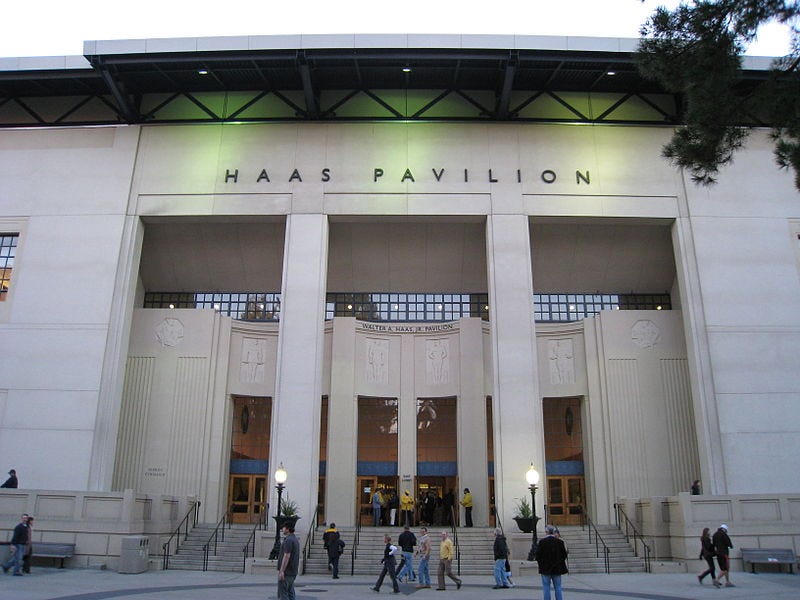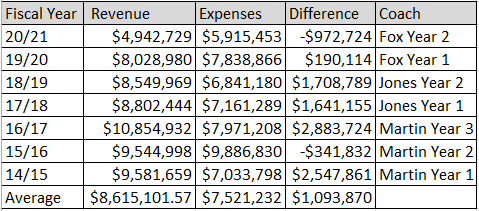Is Cal Men's Basketball A Revenue Program?
Trying to make sense out of a confusing month of messaging from Cal's athletic department
There is a headline that I’ve contemplated using a couple of times over the last few years.
When there was reporting indicating that Cal was leaning towards giving Wyking Jones a 3rd year, I pondered using it. When it was reported earlier this month that Cal was considering offering Mark Fox an extension, I pondered using it if an extension actually happened.
That headline? “Cal MBB is no longer a revenue program.”
It’s a loaded headline, which is partly why the headline I’ve used instead is phrasing the issue as a question. But this isn’t intended as snark or as an insult - I’m treating this question seriously.
In a very literal sense, the answer is and will continue to be a yes. Cal MBB is a revenue program because it has and will continue to earn meaningful revenue. Pac-12 MBB media rights are still worth money, and Cal will continue to cash TV contract dollars. Cal MBB will continue to make money off of ticket revenue, even if that number has greatly dwindled over the last few years.
But it’s also true that the amount of money Cal makes from MBB, even in good times, just isn’t that much relative to expenses. And to illustrate that, here is the money Cal has made and the money Cal has spent on MBB over the last 7 years, directly from reporting by the athletic department:
To start, we have one gigantic honking asterisk - revenue in 20/21 was obviously impacted by COVID, and as a result we can’t really say for sure how much Cal’s declining revenue is the result of a 4th straight 20 loss season vs. the impacts of a global pandemic that caused year-over-year ticket revenue to fall from $1.5 million to $34,784.
Still, a few trends are clear:
Over the last few years, Cal has generally spent less money on the MBB program and earned less revenue on MBB.
Regardless of how successful or unsuccessful Cal is on the court, Cal’s bottom line isn’t hugely impacted.
Cal’s 15/16 numbers seem particularly odd - Cal went undefeated at home, regularly had large crowds and tons of hype, nearly won a Pac-12 title, and went to the NCAA tournament! Why did we lose money?
The answer? Cal’s coaching salary spending was up that year, probably because Cuonzo Martin and staff hit on a bunch of contract bonus provisions due to Cal’s on-court success. And there’s the challenge that Cal faces - there’s a pretty hard cap (but also a decent floor!) on the amount of revenue Cal basketball can make, and any on-court success is probably going to be paired with rising expenses to match.
So if you’re an athletic director of a university that has received all kinds of bad publicity for the massive athletic department structural deficit that you inherited, and you ALSO have inherited a MBB program that was run into the ground by your predecessor, I don’t think it would be far fetched to imagine that you might look at the financial ledger and decide that spending more money is a bad bet.
That kind of financial calculus would explain why you might not want to pay money to fire Wyking Jones when his on-court AND off-court record easily justified a change. That kind of financial calculus might explain why you would be attracted to a known quantity head coach with a strong ethical and academic background who would accept a salary that ranks 2nd to last in the conference.
And it might explain why you would ultimately decide to give that known-quantity head coach another year, because the money just isn’t there to pay for another buy-out and to pay for a coach who can turn things around.
Of course, these aren’t things that you would ever say out loud, because a different part of your job is trying to convince a Cal fans to stay engaged, to buy tickets, and to donate money. But you also have to communicate to media and fans your vision for the program. Which maybe would explain how Jim Knowlton explicitly contradicted himself in the span of two weeks.
Back on March 2, the Chronicle ran an article that directly quoted Jim Knowlton:
Asked this week whether he has thought seriously about extending Fox’s contract in coming months, Knowlton said, “Absolutely, I think it’s important. I think recruits want to know, and I want coaches to know that I have confidence in them.”
But in an article on March 18 from Jeff Faraudo at Sports Illustrated, Knowlton contradicted his earlier statement:
“We’re not talking about a new contract right now,” Knowlton said. “I think someone reported I was working on an extension - it was that I gave every coach an extra year.”
And, for what it’s worth, when informed of Knowlton’s statements to Faraudo, the author of the Chronicle article had this response:
My ‘Cal can’t/won’t spend any excess money on MBB’ theory is one possible explanation for the weird series of reporting before Wyking Jones was fired and might explain Cal’s chaotic messaging over Mark Fox’s job status this month.
The other possibility (sadly, these explanations are not mutually exclusive) is simply that Jim Knowlton isn’t very good at some of the basic parts of being an athletic director. Things like having a pulse on your fans and understanding their likely reaction to your decisions and statements. Things like clear and consistent communication with the media and your fans.
Evidently Mark Fox has received a one year extension just like every other coach in the athletic department, due to COVID. Based on all the information we have access to at the moment, I think it’s very likely that Mark Fox will be back as Cal’s coach next year, but without the multi-year extension discussed in the Chronicle article. Maybe that was always the plan, and there was some sort of weird miscommunication between Knowlton and Connor Letourneau. Maybe an extension WAS on the table, until Knowlton received tons of negative feedback from Cal fans when the news broke. The world may never know.
But for as long as Cal appears unwilling to invest in MBB, I’ll be left wondering if the athletic department actually views MBB as a program that could or should make money for the department, rather than as a program that simply doesn’t lose money.





I will credit Knowlton for not cutting any of Cal's 30 sports - the largest athletics program in the country for a public school (and behind only that of Stanford who recently reversed their decision to cut 11 sports). For comparison, UCLA only has only 24 sports (and none of the two big roster, non-NCAA governed male sports in Rugby and Men's Rowing that also require an equal number of female spots due to Title IX); since this week is the NCAA Men's Swimming and Diving Championship, I will credit a big reason for Cal becoming a national powerhouse to UCLA cutting their men's swim program in 1994. Various Cal non-revenue programs have had varying degrees of successes in trying to fundraise enough money to be financially self-sustaining.
The only way to fiscally save all the sports is to make the money on football. (If the Internet is to be believed), the top basketball programs (Louisville, Duke, Kentucky) *only* makes $20 M in basketball revenue. For comparison, Cal Football already is making around $80+ M in revenue and that number could easily go up to $100+ M with a major bowl appearance.
Sure, you would like to optimize every revenue source, but you also would need to spend money to make money. Clearly, no major Cal donor is forcing Mark Fox out yet, or more importantly, pledging the funds for Cal to competitively hire an exciting new coach.
I'm content to give Fox another year, but my fear is more that he might get an extension for only a marginal improvement of getting Cal to the NIT.
Something worth noting is that Martin Year 3 revenue includes the Mizzou payment on Martin's Buy out, and Fox's year 1-2 data includes Cal paying the Jones' contract where the buy out is spread over the lifetime of the initially agreed upon Jones contract.